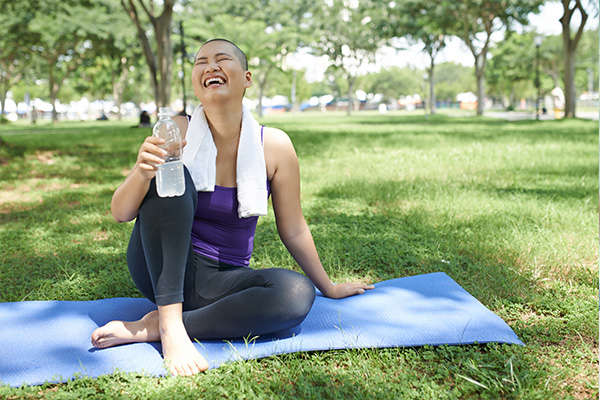Exercise- the best way to fight cancer-related fatigue

Side effects from breast cancer treatment are common and extreme fatigue is typically the biggest complaint. Fatigue is different than being tired and is often defined as a complete lack of energy or excessive whole-body tiredness not relieved by sleep. Fortunately, there is something you can do to alleviate this symptom- exercise. If you weren’t physically active before getting cancer, you need to start being active now. While it may seem counter-intuitive, exercising after surgery and during chemotherapy and radiation is the best way to fight cancer-related fatigue.
Ask your doctor before starting a new regimen but finding a way to exercise during treatment is a great way to be proactive with your health. It doesn’t need to be complicated, simply walking around the block or lifting 2-5lb weights while you watch T.V. will make a difference. Make it more fun by asking a friend to meet you weekly at the gym to walk and talk on the treadmill.
Look beyond the treatment process to your future self. By exercising during treatment, you reduce the risk of any long-lasting fatigue issues after treatment is over. Not only is exercising typically advised and physically beneficial, it’s going to help you emotionally. If reduced stress, better sleep, less anxiety, and better cognitive function sounds appealing to you- get your buns out the door and start moving!
- Reduction in Recurrence Risk: A study published in the Journal of Clinical Oncology found that women who engaged in regular physical activity had a 24% lower risk of breast cancer recurrence compared to those who were less active.
- Overall Survival and Disease-Free Survival: Another study observed that breast cancer survivors who met the recommended 150 minutes of moderate-intensity exercise per week had a 40-50% lower risk of mortality and a significantly higher disease-free survival rate compared to sedentary survivors.
- Mechanisms of Benefit: Exercise helps in maintaining a healthy weight, reducing estrogen levels, improving insulin sensitivity, and enhancing immune function. These factors collectively contribute to the reduced risk of recurrence.
